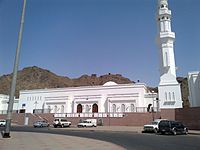Hamad Al-Ansari
Hamad Al-Ansari | |
|---|---|
حماد بن محمد الأنصاري الخزرجي السعدي | |
 | |
| Personal | |
| Born | 1925 Mali |
| Died | October 22, 1997 (aged 71–72) Madinah, Saudi Arabia |
| Religion | Islam |
| Nationality |
|
| Denomination | Sunni |
| Jurisprudence | Maliki |
| Creed | Athari |
| Occupation | Teacher |
| Muslim leader | |
Influenced | |
Hamad Al-Ansari (Arabic: حماد الأنصاري, 1925–1997) was a Muslim scholar of the 20th century who served as a faculty member at the Islamic University in Madinah.[1][2] Al-Ansari specialized in the Islamic science of hadith, but his academic contributions spanned all Islamic sciences, and he was influential over many current prominent scholars and Islamic figures.[3][2][4]
His life and lineage
[edit]Al-Ansari's lineage traces back to the companion of Muhammad, Saʽd ibn ʽUbadah, who was a leader in the tribe of Al-Khazrag.[5] Thus, his full name is Hamad bin Muhammad Al-Ansari Al-Khazragi Al-Saʽdi.
His family
[edit]Al-Ansari grew up in Mali, West Africa, in a scholarly family where his paternal and maternal uncles were scholars and judges.[6] His father died when he was young, which led him to be raised by his mother and uncles. One of his paternal uncles, nicknamed Al-Bahr (Arabic for the Sea), was renowned for his vast knowledge and was esteemed as the leading scholar in the entirety of West Africa.[6]
Early studies
[edit]| Part of a series on:
Salafi movement |
|---|
 |
|
|
At the age of 8, Al-Ansari memorized the Quran.[7] He pursued traditional Islamic studies, delving into Arabic grammar and rhetoric, Hadith studies, and fiqh (Islamic jurisprudence), where he memorized the Maliki jurisprudence text Mukhtasar of Khalil.[8]
Escaping persecution
[edit]At 21, Al-Ansari, along with some friends, decided to leave Mali, then under English and French occupation, due to persecution faced by scholars and students of Islamic studies.[9]Their destination was Mecca. They embarked on their journey by camel, traveling through countries like Niger, Nigeria, and Sudan, encountering scholars and students of knowledge along the way.
Entering Saudi Arabia
[edit]Al-Ansari arrived in Mecca at 23, where he encountered scholar Hamid Faqi, who taught him Islamic creed and Hadith sciences and introduced him to the works of Ibn Taymiyyah, Ibn al-Qayyim, the Nagdi School, and Muhammad bin Abdulwahab.[10] He also studied under Abdur-Rahman al-Mu'allimee al-Yamani and Taqi-ud-Din al-Hilali. In 1953, he moved to Riyadh, working as a teacher supervised by Muhammad ibn Ibrahim Al ash-Sheikh. After 11 years, he relocated to Madinah to teach at the Islamic University until his passing.[11]
Al-Ansari established a small library near the Holy Mosque in Madinah, where students conducting graduate studies at the Islamic University sought his guidance on research, general inquiries, and feedback on their work. His library housed numerous manuscripts, primarily focusing on Athari creed or Hadith sciences.[12][2][4]
His status
[edit]Al-Ansari was a respected scholar, attracting students worldwide to seek accreditation from him. Eminent scholars and government officials would consult him on creedal, jurisprudential, and societal matters. Some of the scholars who used to consult him include: Ibn Baz, Abu Bakr Al-Jazaeri, Bakr Abu Zayd, and Saleh Al-Luhaidan.[13][2][4]
Death
[edit]Al-Ansari passed away at the age of 74 on Wednesday, October 22, 1997, after falling into a nine-month coma due to a medical error. He was buried in Madinah, near the burial site of Muhammad's daughters.[14][2][4]
References
[edit]Citations
[edit]- ^ Al-Ansari 2002, p. 35.
- ^ a b c d e Al-Numan 1997.
- ^ Al-Ansari 2002, pp. 63–65.
- ^ a b c d Hatim 1990.
- ^ Al-Ansari 2002, p. 7.
- ^ a b Al-Ansari 2002, p. 8.
- ^ Al-Ansari 2002, pp. 8–9.
- ^ Al-Ansari 2002, p. 9.
- ^ Al-Ansari 2002, pp. 9–12.
- ^ Al-Ansari 2002, p. 11.
- ^ Al-Ansari 2002, pp. 12–14.
- ^ Al-Ansari 2002, pp. 15–18.
- ^ Al-Ansari 2002, p. 17.
- ^ Al-Ansari 2002, pp. 8, 27.
Bibliography
[edit]- Al-Ansari, Abdul-Awal (2002). Al-Majmu' fi Tarjamat al-'Alamah al-Muhaddith ash-Sheikh Hamad bin Muhammad al-Ansari [The collection in the autobiography of the eminent scholar, the Muhaddith Sheikh Hamad bin Muhammad Al-Ansari] (PDF) (in Arabic) (1st ed.). Madinah, Saudi Arabia: Islamic University of Madinah.
- "Man huwa Hamad Al-Ansari" [Who is Hamad Al-Ansari]. Okaz (in Arabic) (11405): 19. 7 November 1997.
- Al-Numan, Abdul-Muman (3 November 1997). "Al-Ansari, Alamatu al-Hadith al-Mu'asir" [Al-Ansari, the Great Contemporary Hadith Scholar]. Madinah (in Arabic) (12621): 10.
- Hatim, Jamal (14 April 1990). "Ash-Shaykh Hamad al-Ansari ra'is qism as-sunnah wa ustaz ad-diraasat al-'ulya bil-Jami'ah al-Islamiyah bil-Madinah al-Munawwarah fi hadeeth ma'a (at-tawhid)" [Sheikh Hamad al-Ansari, Head of the Department of Sunnah and Professor of Graduate Studies at the Islamic University of Madinah, in a conversation with (monotheism) magazine.]. Tawheed (in Arabic). No. 7th.
Text is available under the CC BY-SA 4.0 license; additional terms may apply.
Images, videos and audio are available under their respective licenses.
